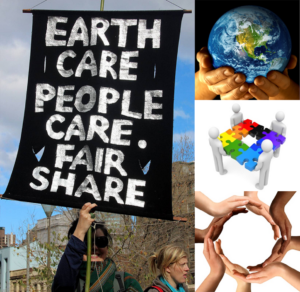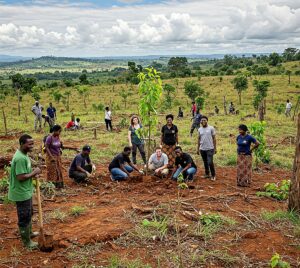
One aspect of Permaculture, which sets it apart from many other agriculture-based systems, is that it is based upon a set of ethics. Ethics are generally a set of rules, codes, or guidelines which help to govern our moral behavior. The ethics of Permaculture are only three in number—Earth Care, People Care, and Fair Share—yet, despite the simplicity embraced within this set of moral codes, it is astonishing how absent they remain within many of today’s approaches to agriculture, economics, environment, social interactions, and governance.
On June 18th, 2015 the Vatican in Rome officially published Pope Francis’ encyclical on climate change. Entitled Laudato Si’ (Praised Be) On Care for our Common Home, even the name on this papal letter carried deep ecological significance. Pope Francis chose the name Francis due to his affinity to St. Francis of Assisi, an Italian friar who lived between the years of 1181 and 1226. St. Francis of Assisi is often associated with nature and, after being canonized in 1228, he came to be known as the Patron Saint of Animals. On November 29, 1979, Pope John Paul II declared St. Francis the Patron Saint of Ecology, and on World Environment Day in 1982, John Paul II said that St. Francis’ love and care for creation was a reminder “not to behave like dissident predators where nature is concerned, but to assume responsibility for it, taking all care so that everything stays healthy and integrated, so as to offer a welcoming and friendly environment even to those who succeed us.”
Back in the late 1990’s, my wife and I came across a manual entitled Teaching Conservation in Developing Nations. In the forward of this manual there was a quote which we continue to use to this day whenever teaching a course on Permaculture or Agroecology. It reads:
“People will not preserve and protect a natural environment which they do not understand or respect. When people learn about the relationship of all forms of life to each other and to the earth, they begin to have a responsible attitude toward natural resources and their wise use.”

We don’t need to go to a church or mosque or temple to assume an ethical or moral responsibility towards preserving and protecting our environment, we just need to have an understanding and a respect of the internal workings of that environment. In other words, we need to find a bit of ‘truth.’ In Ralph Waldo Emerson’s essay on Nature, he wrote that: “The moral difference of nature upon every individual is that amount of truth which it illustrates to him.” And, in the same essay, he stated that: “A life in harmony with Nature, the love of truth and of virtue, will purge the eyes to understand her text. By degrees we may come to know the primitive sense of the permanent objects of nature, so that the world shall be to us an open book, and every form significant of its hidden life and final cause.”
Permaculture ethics—Earth Care, People Care, Fair Share—help to guide us in our pursuit of truth, justice, and virtue. If the systems that we are creating for sustaining our lives and livelihoods are not caring for the earth, if they are not caring for people, and if they are not designed to share resources equitably or return surplus back into the system, then it’s not Permaculture and it’s certainly not sustainable.
All donations go directly towards helping to spread Permaculture solutions throughout Malawi. Every little bit helps, and even a little can go a long way!
